Unit 2 My week 单元复习(三)-语法+典型例题(共52张PPT)
文档属性
| 名称 | Unit 2 My week 单元复习(三)-语法+典型例题(共52张PPT) |
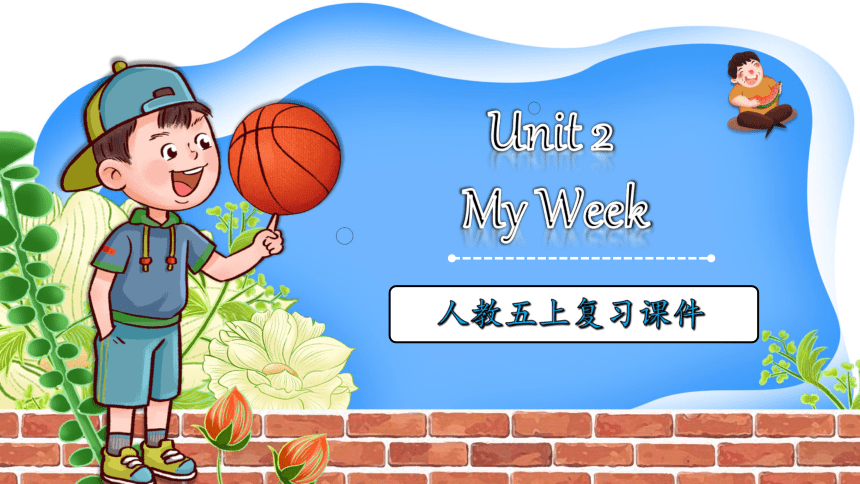
|
|
| 格式 | pptx | ||
| 文件大小 | 13.9MB | ||
| 资源类型 | 试卷 | ||
| 版本资源 | 人教版(PEP) | ||
| 科目 | 英语 | ||
| 更新时间 | 2024-08-16 00:00:00 | ||
图片预览

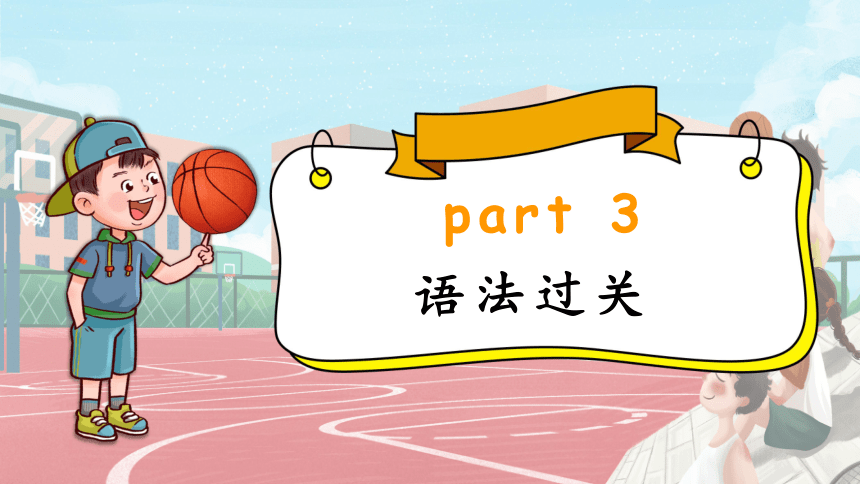
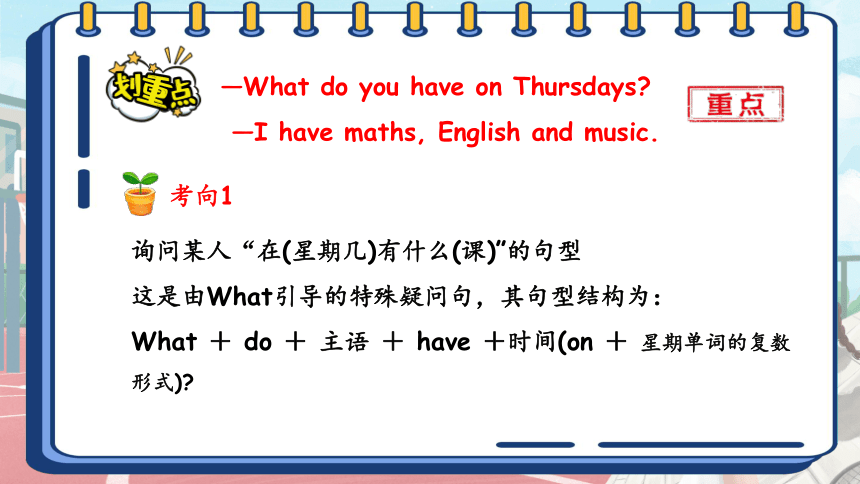
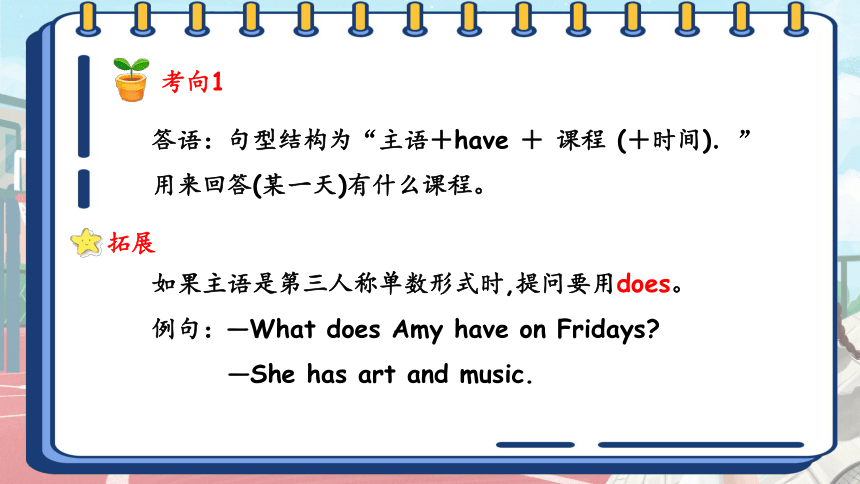
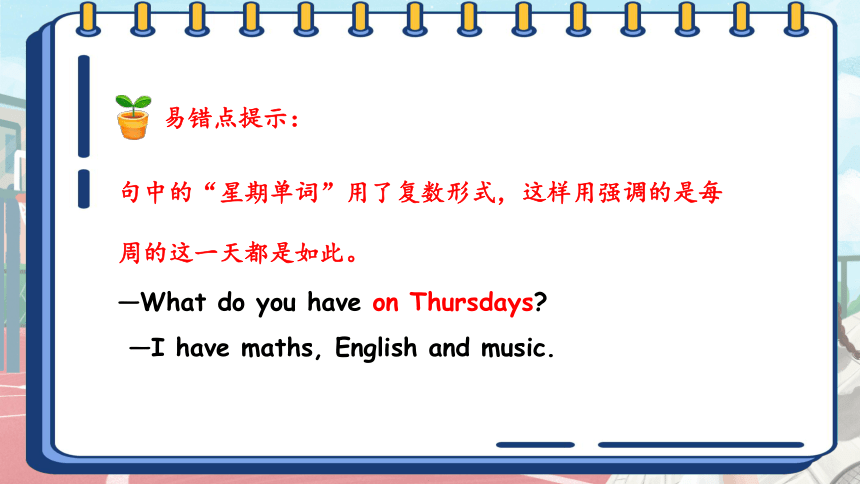
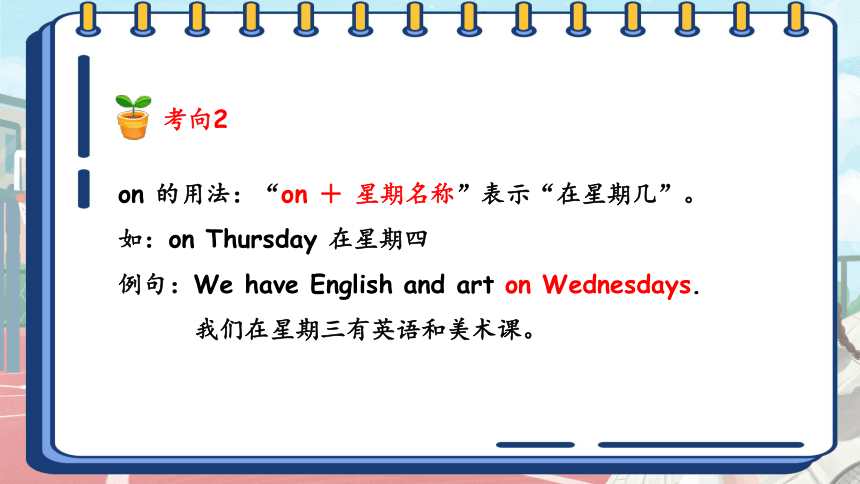
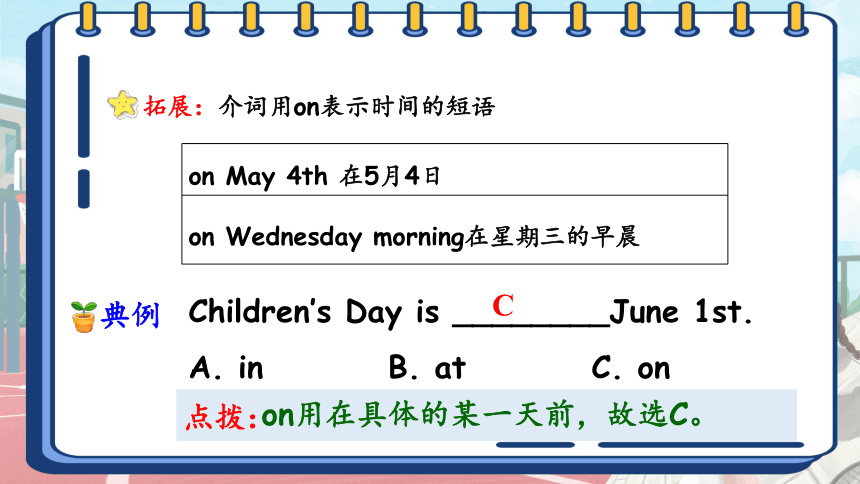
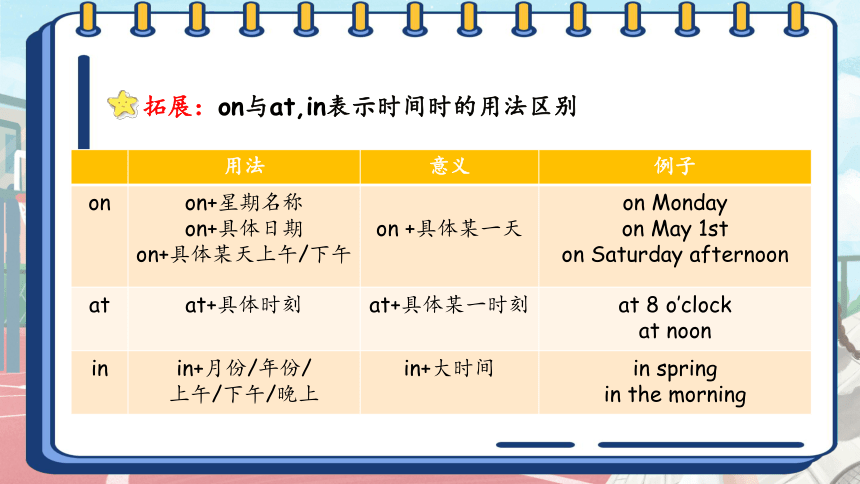
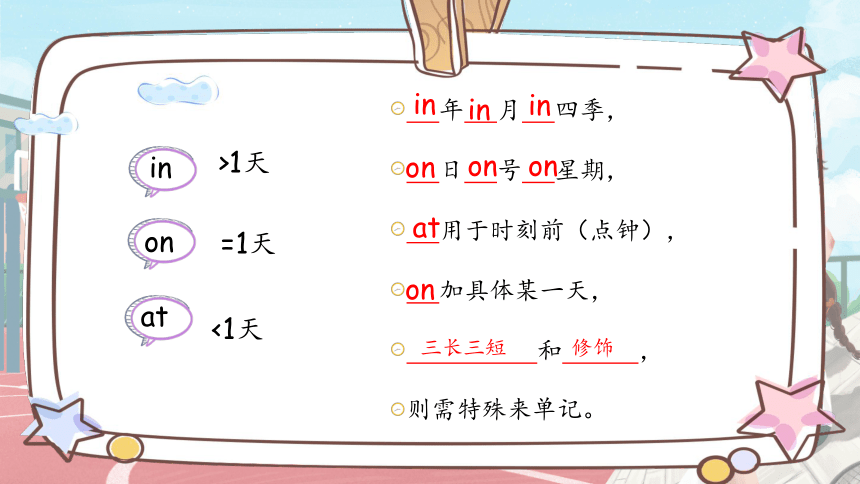
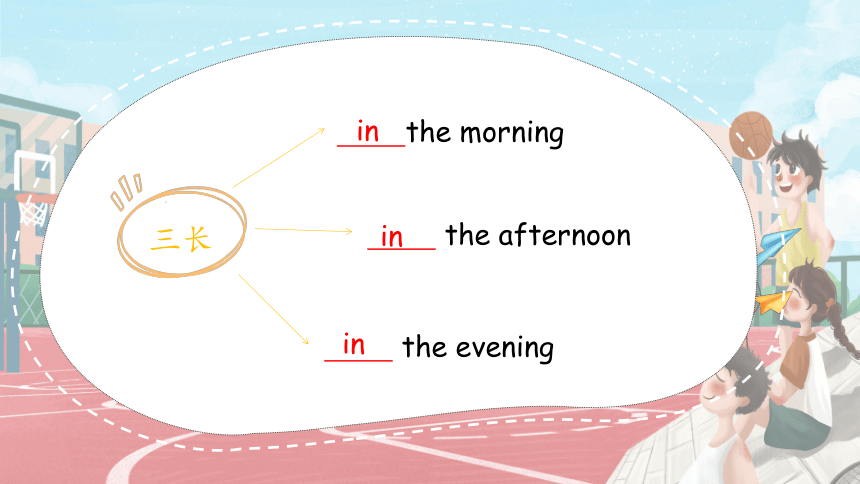
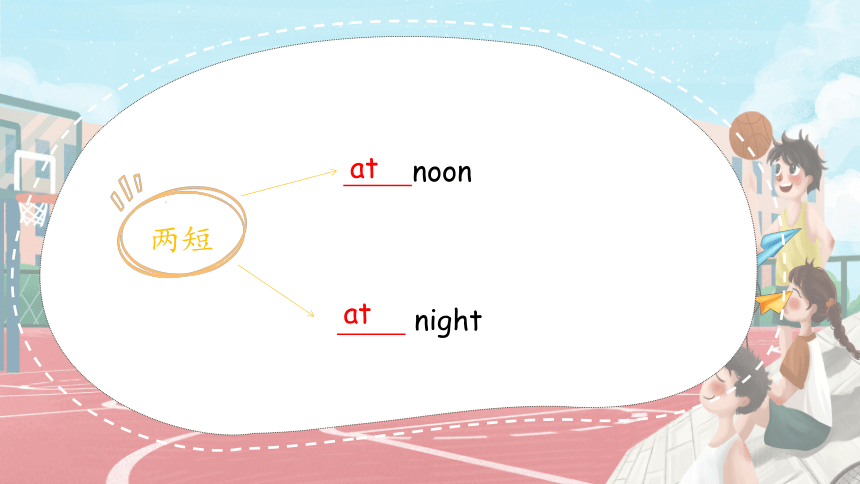
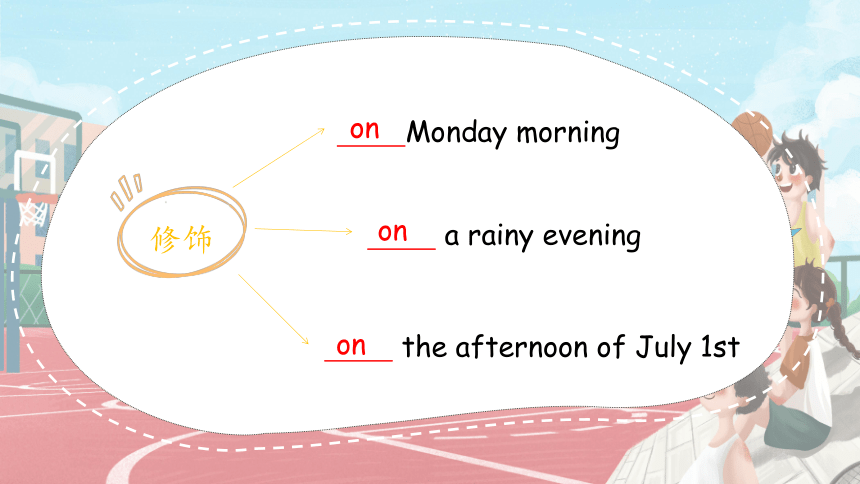
文档简介
(共52张PPT)
Unit 2
My Week
人教五上复习课件
语法过关
part 3
—What do you have on Thursdays
—I have maths, English and music.
询问某人“在(星期几)有什么(课)”的句型
这是由What引导的特殊疑问句,其句型结构为:
What + do + 主语 + have +时间(on + 星期单词的复数形式)
考向1
考向1
答语:句型结构为“主语+have + 课程 (+时间).”用来回答(某一天)有什么课程。
拓展
如果主语是第三人称单数形式时,提问要用does。
例句:—What does Amy have on Fridays
—She has art and music.
易错点提示:
句中的“星期单词”用了复数形式,这样用强调的是每周的这一天都是如此。
—What do you have on Thursdays
—I have maths, English and music.
考向2
on 的用法:“on + 星期名称”表示“在星期几”。
如:on Thursday 在星期四
例句:We have English and art on Wednesdays.
我们在星期三有英语和美术课。
拓展:介词用on表示时间的短语
on May 4th 在5月4日
on Wednesday morning在星期三的早晨
Children’s Day is ________June 1st.
A. in B. at C. on
典例
点拨:
C
on用在具体的某一天前,故选C。
拓展:on与at,in表示时间时的用法区别
用法 意义 例子
on on+星期名称 on+具体日期 on+具体某天上午/下午 on +具体某一天 on Monday
on May 1st
on Saturday afternoon
at at+具体时刻 at+具体某一时刻 at 8 o’clock
at noon
in in+月份/年份/ 上午/下午/晚上 in+大时间 in spring
in the morning
年 月 四季,
日 号 星期,
用于时刻前(点钟),
加具体某一天,
和 ,
则需特殊来单记。
in
on
at
>1天
=1天
<1天
in
in
in
on
on
on
at
on
三长三短
修饰
三长
the morning
the afternoon
the evening
in
in
in
两短
noon
night
at
at
修饰
Monday morning
a rainy evening
the afternoon of July 1st
on
on
on
用于时刻前,亦与正午,午夜连。
黎明终止和开端, 与之紧相伴。
周,月,季,年,长时间, 须放在其前面。
泛指一晌和傍晚,也要放在 后边。
指特定某一天,日期星期节日前。
某天上下和夜晚,依然要在 后站。
今明昨天前后天,上下这那每之前。
都不用,此乃习惯记心间。
at
at
in
in
on
in
at,on,in
2020
summer
the morning
January
3:20
noon
May 1st
Monday
Sunday
Children’s Day
in
in
in
in
at
at
on
on
on
on
用in at on填空。
cooking/'k k /n.烹饪;烹调[三会]
考向
例句:I like cooking.我喜欢烹饪。
短语:have a cooking class 有一堂烹饪课
Chinese cooking 中式烹饪
词形变化:cooking(n.)烹饪;烹调→cook(v.)烹饪
Do you often read books in this park
你经常在这个公园里读书吗?
考向1
以do开头的一般疑问句的用法:用来询问对方是否经常做某事,其句式结构为:Do+ 主语(+ 频率副词)+ 动词原形 +其他?
例句:—Do you often watch TV
—Yes, I do.
考向2
答语:
肯定回答“Yes, 主语 + do.”
否定回答“No, 主语 + don’t.”两种形式。
例句:—Do you play football on the weekend
—Yes, I do.
— No, I don’t.
易错点提示
当句中的主语是第三人称单数(he, she, it)时,该疑问句要以do的第三人称单数形式does开头,而且肯定回答用 “Yes, 主语 + does.”否定回答用“No, 主语 + doesn’t.”。
例句:—Does he listen to music 他听音乐吗?
—Yes, he does.是的,他听。
— No, he doesn’t.不,他不听。
典例
1.按要求完成句子。
—Do you go to the park on the weekend
—__________(作肯定回答)
Yes, I do.
典例
2. —Do you often watch TV on the weekend
—________
A. Yes, I can. B. Yes, I am. C. Yes, I do.
C
点拨:
本句是以do开头的一般疑问句,它的肯定回答为“Yes, 主语 + do.”,故选C。
典例
3. ________ he often play football on the weekend
A. Does B. Do C. do
A
点拨:
因为主语是第三人称单数形式he,所以一般疑问句要以Does开头,后接动词原形do。
read/ri d/v.看;读
短语:read books读书
近义词:look(看),see(看见)
短语:read newspapers看报
read a magazine读杂志
例句:I often read English in the morning.
我经常在早上读英语。
考点1
拓展:
词语辨析:look, see, watch和read的用法区别。
look 强调“看”的动作。单独使用时,用来引起对方的注意;如果跟宾语,和at连用,
如:Look at the blackboard.看黑板。
see 强调“看”的结果,意为“看见,看到”,
如:I see a bird.我看见一只鸟。
watch 强调“专注地看”,有欣赏的意味,
如watch TV 看电视。
read 指阅读一类的“看”,与纸张类有关,
如read books看书。
典例
I ________ books and my mother ________ TV at weekends.
A. watch, reads B. read, watches
C. see, watches
B
点拨:
read books和watch TV是固定短语,故选B。
What do you often do on the weekend
在周末你经常干什么?
询问对方在某一天经常干什么?
句型“What do you(+often)+ 实义动词do+时间?”来提问。回答用“主语(+often)+动词(短语)+时间(时间常省略)”来完成。
考向:用法及答语
根据答语填写所缺的词,完成句子。
—What do you often ________ on Sundays
—We often play football.
点拨:
由答语“We often play football.”知,是对做什么活动提问,要用句型“What do you often do + 时间?”。
do
典例
易错点提示
当主语是第三人称单数的时候,注意问句中的助动词“do”要改成does!答语中的实义动词也要用第三人称单数形式(动词后加 s或 es)。
例句:—What does Tom often do on Wednesdays
汤姆在星期三经常干什么?
—He often draws pictures with his friends.
他常和他的朋友一起画画。
What about you 你怎么样?
用法:这是用来征求对方看法和意见的句型,通常用在自己陈述了一个事实后,来询问对方是什么情况或有什么样的看法或意见。
例句:I’m a teacher. What about you
我是一名老师。你呢?
其他表达法:And you 你呢?
How about you 你怎么样?
例句:I’m fine. And you
我很好,你呢?
典例
I play sports on the weekend. ________ you
A.What B.What about C.How
B
点拨:
本题意思是“我周末做体育运动,你呢?”,What about you 意为“你呢?”故选B。
every day与everyday的区别:
every day 每天。副词,可用作状语。
You should read books every day.
你应该每天看书。
everyday 每天的。形容词,可用作定语。
The Internet has become part of everyday life.
互联网已成为日常生活的一部分。
play 用法:
play的用法
play+球类/棋类/牌类
play+the+乐器
play+with+其他
play football
play chess
play basketball
play cards
play the piano
play the violin
play with snows
play with cats
play with Mikes
典例:选词填空
A.a B./ C. the
①Tom likes playing ________ chess.
②He is playing________violin.
③ Zhang Peng will play________ basketball thisafternoon.
B
C
B
need用法:
need的用法
need+名词 需要某物
I need a book.
need+doing 需要被做某事
These plants need watering.
need+动词原形 需要做某事
I need to buy a new bike.
一般疑问句:能用yes / no(或相当于yes / no)回答的问句
3.情态动词(can/may)引导的一般疑问句
2.助动词(do/does)引导的一般疑问句
1.be动词(is,are)引导的一般疑问句
--Are you a teacher
--Yes,I am/No,I am not.
类型:
--Do you like apples
--Yes,I do/No,I don’t
--Can you sing
--Yes,I can/No,I can’t
一般疑问句的语调
大部分的一般疑问句都应读作升调(↗),并落在最后一个单词身上。
考点:
考试中经常会考察一般疑问句的答语,大家要记住:
Be动词提问,be动词回答;do/does提问,do/does回答;can提问,can回答。
频度副词:表示动作发生的次数,频率的副词叫做频度副词。
频度副词
always 总是 100%
often 经常 60%
hardly ever= seldom 10%
never 从不 0%
usually 通常 80%
高
低
sometimes 30%
频度副词:表示动作发生的次数,频率的副词叫做频度副词。
频度副词的位置:一般放在主语后,实义动词前;
有时放在句首表强调。
I often read books in this park.
He usually gets up at 6 o’clock.
Sometimes ,I read books.
典型例题
( )1.Do you often TV.
A. look B. watch C. read
( )2.We often do homework Saturdays.
A. in B. at C. on
( )3.I often listen music after school.
A. On B. for C. to
C
B
C
( )4. You ________ sports every day.
A. should play B. are play
C. does play
( )5. Here__________ a new schedule for you.
A. am B. is C. are
A
B
( )6. I ________ sports. 【逆向思维法】
A. likes B. doesn’t like
C. don’t like
方法点拨:本题用逆向思维法解答。第一人称I后跟原形,所以likes 与doesn’t like都不对,所以选don’t like。
C
( )7. What do you do ________ Sundays
A. to B. at C. on
( )8. Wu Yifan often ________ on the weekend.
A. watch TV B. watching TV
C. watches TV
C
C
( )9.Look my picture.
A. at B./ C.on
( )10.What do you do Thursdays
A. at B. on C. in
( )11.I have a class
A. cook B. cooking C. cooks
A
B
B
( )12. ________the pictures of me.
A. Look B. Look is C. Look at
( )13. I ________ maths, English and music.
A. has B. am C. have
点拨:短语Look at“看……”为固定搭配。
C
C
( )14. —________your music teacher
—Li Ming’s father.
A. What’s B. Who’s C. Where’s
( )15. I drink some tea ________ your grandma!
A. and B. for C. with
点拨:with+某人,表示与某人一起。
B
C
( )16. —What ________ you ________ on Mondays
—I have PE.
A. do; does B. are; have C. do; have
( )17. I have six________ on Tuesdays.
A. class B. classes C. a class
( )18. Work out a schedule ________ your partner.
A. with B. and C. to
C
B
A
( )19. —Is it Friday today
—________
A. Yes, it’s. B. No, it is. C. No, it isn’t.
方法点拨:简略回答时,it is不可以用缩写形式,故A错误。
C
( )20. John________ Chinese, maths and PE on Mondays.
A. is B. has C. have
方法点拨:John是第三人称单数,谓语动词要用“单三”形式,故选B。
B
21.I like the red bike. ________ you
A. What B. How C. How about
C
点拨:
本题意思是“我喜欢这辆红色的自行车,你呢 ”,How about you?意为“你呢?”故选C。
THANK YOU!
Unit 2
My Week
人教五上复习课件
语法过关
part 3
—What do you have on Thursdays
—I have maths, English and music.
询问某人“在(星期几)有什么(课)”的句型
这是由What引导的特殊疑问句,其句型结构为:
What + do + 主语 + have +时间(on + 星期单词的复数形式)
考向1
考向1
答语:句型结构为“主语+have + 课程 (+时间).”用来回答(某一天)有什么课程。
拓展
如果主语是第三人称单数形式时,提问要用does。
例句:—What does Amy have on Fridays
—She has art and music.
易错点提示:
句中的“星期单词”用了复数形式,这样用强调的是每周的这一天都是如此。
—What do you have on Thursdays
—I have maths, English and music.
考向2
on 的用法:“on + 星期名称”表示“在星期几”。
如:on Thursday 在星期四
例句:We have English and art on Wednesdays.
我们在星期三有英语和美术课。
拓展:介词用on表示时间的短语
on May 4th 在5月4日
on Wednesday morning在星期三的早晨
Children’s Day is ________June 1st.
A. in B. at C. on
典例
点拨:
C
on用在具体的某一天前,故选C。
拓展:on与at,in表示时间时的用法区别
用法 意义 例子
on on+星期名称 on+具体日期 on+具体某天上午/下午 on +具体某一天 on Monday
on May 1st
on Saturday afternoon
at at+具体时刻 at+具体某一时刻 at 8 o’clock
at noon
in in+月份/年份/ 上午/下午/晚上 in+大时间 in spring
in the morning
年 月 四季,
日 号 星期,
用于时刻前(点钟),
加具体某一天,
和 ,
则需特殊来单记。
in
on
at
>1天
=1天
<1天
in
in
in
on
on
on
at
on
三长三短
修饰
三长
the morning
the afternoon
the evening
in
in
in
两短
noon
night
at
at
修饰
Monday morning
a rainy evening
the afternoon of July 1st
on
on
on
用于时刻前,亦与正午,午夜连。
黎明终止和开端, 与之紧相伴。
周,月,季,年,长时间, 须放在其前面。
泛指一晌和傍晚,也要放在 后边。
指特定某一天,日期星期节日前。
某天上下和夜晚,依然要在 后站。
今明昨天前后天,上下这那每之前。
都不用,此乃习惯记心间。
at
at
in
in
on
in
at,on,in
2020
summer
the morning
January
3:20
noon
May 1st
Monday
Sunday
Children’s Day
in
in
in
in
at
at
on
on
on
on
用in at on填空。
cooking/'k k /n.烹饪;烹调[三会]
考向
例句:I like cooking.我喜欢烹饪。
短语:have a cooking class 有一堂烹饪课
Chinese cooking 中式烹饪
词形变化:cooking(n.)烹饪;烹调→cook(v.)烹饪
Do you often read books in this park
你经常在这个公园里读书吗?
考向1
以do开头的一般疑问句的用法:用来询问对方是否经常做某事,其句式结构为:Do+ 主语(+ 频率副词)+ 动词原形 +其他?
例句:—Do you often watch TV
—Yes, I do.
考向2
答语:
肯定回答“Yes, 主语 + do.”
否定回答“No, 主语 + don’t.”两种形式。
例句:—Do you play football on the weekend
—Yes, I do.
— No, I don’t.
易错点提示
当句中的主语是第三人称单数(he, she, it)时,该疑问句要以do的第三人称单数形式does开头,而且肯定回答用 “Yes, 主语 + does.”否定回答用“No, 主语 + doesn’t.”。
例句:—Does he listen to music 他听音乐吗?
—Yes, he does.是的,他听。
— No, he doesn’t.不,他不听。
典例
1.按要求完成句子。
—Do you go to the park on the weekend
—__________(作肯定回答)
Yes, I do.
典例
2. —Do you often watch TV on the weekend
—________
A. Yes, I can. B. Yes, I am. C. Yes, I do.
C
点拨:
本句是以do开头的一般疑问句,它的肯定回答为“Yes, 主语 + do.”,故选C。
典例
3. ________ he often play football on the weekend
A. Does B. Do C. do
A
点拨:
因为主语是第三人称单数形式he,所以一般疑问句要以Does开头,后接动词原形do。
read/ri d/v.看;读
短语:read books读书
近义词:look(看),see(看见)
短语:read newspapers看报
read a magazine读杂志
例句:I often read English in the morning.
我经常在早上读英语。
考点1
拓展:
词语辨析:look, see, watch和read的用法区别。
look 强调“看”的动作。单独使用时,用来引起对方的注意;如果跟宾语,和at连用,
如:Look at the blackboard.看黑板。
see 强调“看”的结果,意为“看见,看到”,
如:I see a bird.我看见一只鸟。
watch 强调“专注地看”,有欣赏的意味,
如watch TV 看电视。
read 指阅读一类的“看”,与纸张类有关,
如read books看书。
典例
I ________ books and my mother ________ TV at weekends.
A. watch, reads B. read, watches
C. see, watches
B
点拨:
read books和watch TV是固定短语,故选B。
What do you often do on the weekend
在周末你经常干什么?
询问对方在某一天经常干什么?
句型“What do you(+often)+ 实义动词do+时间?”来提问。回答用“主语(+often)+动词(短语)+时间(时间常省略)”来完成。
考向:用法及答语
根据答语填写所缺的词,完成句子。
—What do you often ________ on Sundays
—We often play football.
点拨:
由答语“We often play football.”知,是对做什么活动提问,要用句型“What do you often do + 时间?”。
do
典例
易错点提示
当主语是第三人称单数的时候,注意问句中的助动词“do”要改成does!答语中的实义动词也要用第三人称单数形式(动词后加 s或 es)。
例句:—What does Tom often do on Wednesdays
汤姆在星期三经常干什么?
—He often draws pictures with his friends.
他常和他的朋友一起画画。
What about you 你怎么样?
用法:这是用来征求对方看法和意见的句型,通常用在自己陈述了一个事实后,来询问对方是什么情况或有什么样的看法或意见。
例句:I’m a teacher. What about you
我是一名老师。你呢?
其他表达法:And you 你呢?
How about you 你怎么样?
例句:I’m fine. And you
我很好,你呢?
典例
I play sports on the weekend. ________ you
A.What B.What about C.How
B
点拨:
本题意思是“我周末做体育运动,你呢?”,What about you 意为“你呢?”故选B。
every day与everyday的区别:
every day 每天。副词,可用作状语。
You should read books every day.
你应该每天看书。
everyday 每天的。形容词,可用作定语。
The Internet has become part of everyday life.
互联网已成为日常生活的一部分。
play 用法:
play的用法
play+球类/棋类/牌类
play+the+乐器
play+with+其他
play football
play chess
play basketball
play cards
play the piano
play the violin
play with snows
play with cats
play with Mikes
典例:选词填空
A.a B./ C. the
①Tom likes playing ________ chess.
②He is playing________violin.
③ Zhang Peng will play________ basketball thisafternoon.
B
C
B
need用法:
need的用法
need+名词 需要某物
I need a book.
need+doing 需要被做某事
These plants need watering.
need+动词原形 需要做某事
I need to buy a new bike.
一般疑问句:能用yes / no(或相当于yes / no)回答的问句
3.情态动词(can/may)引导的一般疑问句
2.助动词(do/does)引导的一般疑问句
1.be动词(is,are)引导的一般疑问句
--Are you a teacher
--Yes,I am/No,I am not.
类型:
--Do you like apples
--Yes,I do/No,I don’t
--Can you sing
--Yes,I can/No,I can’t
一般疑问句的语调
大部分的一般疑问句都应读作升调(↗),并落在最后一个单词身上。
考点:
考试中经常会考察一般疑问句的答语,大家要记住:
Be动词提问,be动词回答;do/does提问,do/does回答;can提问,can回答。
频度副词:表示动作发生的次数,频率的副词叫做频度副词。
频度副词
always 总是 100%
often 经常 60%
hardly ever= seldom 10%
never 从不 0%
usually 通常 80%
高
低
sometimes 30%
频度副词:表示动作发生的次数,频率的副词叫做频度副词。
频度副词的位置:一般放在主语后,实义动词前;
有时放在句首表强调。
I often read books in this park.
He usually gets up at 6 o’clock.
Sometimes ,I read books.
典型例题
( )1.Do you often TV.
A. look B. watch C. read
( )2.We often do homework Saturdays.
A. in B. at C. on
( )3.I often listen music after school.
A. On B. for C. to
C
B
C
( )4. You ________ sports every day.
A. should play B. are play
C. does play
( )5. Here__________ a new schedule for you.
A. am B. is C. are
A
B
( )6. I ________ sports. 【逆向思维法】
A. likes B. doesn’t like
C. don’t like
方法点拨:本题用逆向思维法解答。第一人称I后跟原形,所以likes 与doesn’t like都不对,所以选don’t like。
C
( )7. What do you do ________ Sundays
A. to B. at C. on
( )8. Wu Yifan often ________ on the weekend.
A. watch TV B. watching TV
C. watches TV
C
C
( )9.Look my picture.
A. at B./ C.on
( )10.What do you do Thursdays
A. at B. on C. in
( )11.I have a class
A. cook B. cooking C. cooks
A
B
B
( )12. ________the pictures of me.
A. Look B. Look is C. Look at
( )13. I ________ maths, English and music.
A. has B. am C. have
点拨:短语Look at“看……”为固定搭配。
C
C
( )14. —________your music teacher
—Li Ming’s father.
A. What’s B. Who’s C. Where’s
( )15. I drink some tea ________ your grandma!
A. and B. for C. with
点拨:with+某人,表示与某人一起。
B
C
( )16. —What ________ you ________ on Mondays
—I have PE.
A. do; does B. are; have C. do; have
( )17. I have six________ on Tuesdays.
A. class B. classes C. a class
( )18. Work out a schedule ________ your partner.
A. with B. and C. to
C
B
A
( )19. —Is it Friday today
—________
A. Yes, it’s. B. No, it is. C. No, it isn’t.
方法点拨:简略回答时,it is不可以用缩写形式,故A错误。
C
( )20. John________ Chinese, maths and PE on Mondays.
A. is B. has C. have
方法点拨:John是第三人称单数,谓语动词要用“单三”形式,故选B。
B
21.I like the red bike. ________ you
A. What B. How C. How about
C
点拨:
本题意思是“我喜欢这辆红色的自行车,你呢 ”,How about you?意为“你呢?”故选C。
THANK YOU!
